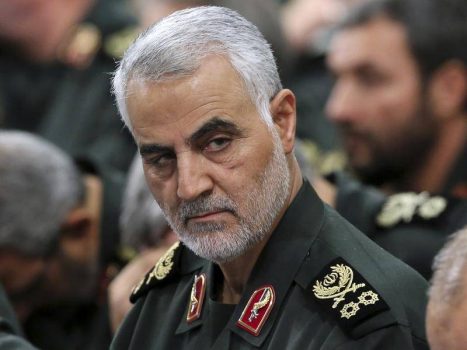 Iran’s most powerful military commander, General Qasem Soleimani, has been killed by a US air strike in Iraq. Qasem Soleimani was the head of Iran’s elite Quds Force.
Iran’s most powerful military commander, General Qasem Soleimani, has been killed by a US air strike in Iraq. Qasem Soleimani was the head of Iran’s elite Quds Force.
He was killed at Baghdad airport early on Friday morning in a strike ordered by US President, Donald Trump.
The airport strike also killed Abu Mahdi al-Muhandis, deputy commander of Iran-backed militias in Iraq known as the Popular Mobilization Forces, and five others, including the PMF’s airport protocol officer, Mohammed Reda, Iraqi officials said.
Gen. Soleimani killing marks an escalation of the standoff between Washington and Iran since President Donald Trump withdrew from the 2015 nuclear deal and imposed economic sanctions.
Iran has vowed “harsh retaliation” in response to Soleimani’s killing.
Iran’s Supreme Leader Ayatollah Ali Khamenei has warned that a “harsh retaliation is waiting” for the U.S. after the airstrike, calling Soleimani the “international face of resistance.” Khamenei has declared three days of public mourning for the general’s death. Iran also summoned the Swiss Charges d’Affaires, who represents U.S. interests in Tehran, to protest the killing.
Over the last two decades Soleimani had assembled a network of powerful and heavily armed allies stretching all the way to southern Lebanon. The killing, and any forceful retaliation by Iran, could ignite a conflict that could engulf the whole region, endangering U.S. troops in Iraq, Syria and beyond.
The United States Defense Department said it killed Soleimani because he “was actively developing plans to attack American diplomats and service members in Iraq and throughout the region.” It also accused Soleimani of approving the orchestrated violent protests at the U.S. Embassy in Baghdad earlier this week.
Iran had been accused of attacking the US and its allies via proxies for months. They were accused of hitting Saudi oilfields and oil tankers in the Gulf. Iran has also been accused by the United States of directing this week’s attacks on the US Embassy in Baghdad.

ByteDance Refuses TikTok Sale Despite US Pressure, Plans Legal Challenge
Harvey Weinstein’s Rape Conviction Overturned, Paving Way For New Trial
Biden Administration Imposes New Sanctions On Iran Following Attack On Israel
Israel’s European Allies Urge Restraint Amid Escalating Tensions With Iran